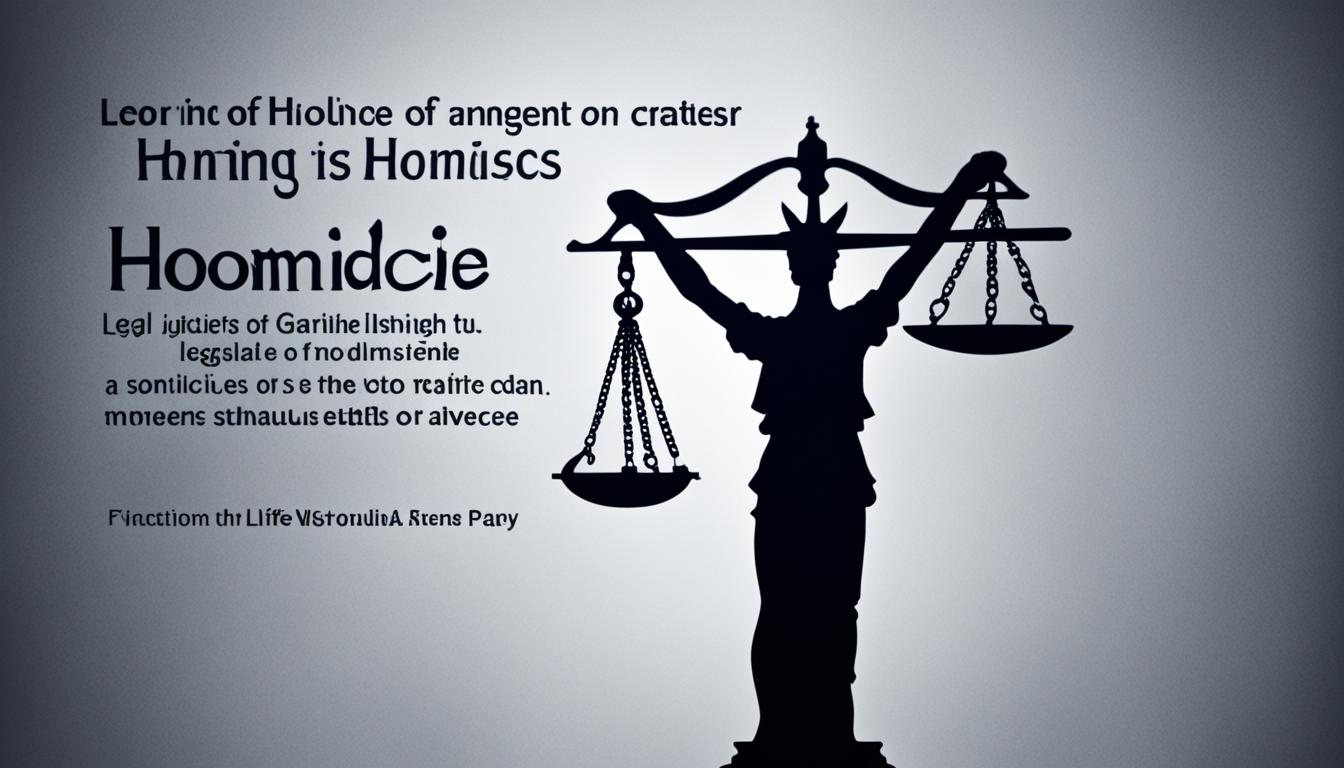Homicide vs Murder: Legal Differences Explained
When we talk about homicide and murder, we often use these terms interchangeably. However, from a legal perspective, there are important distinctions between the two. Homicide refers to any killing of one person by another, whether it is lawful or unlawful. On the other hand, murder is always a crime and involves the intentional killing of another person with malice aforethought.
One key difference between the two is the element of premeditation or deliberation. If the killing was planned in advance, it is classified as first-degree murder. If there was no premeditation, it falls into the category of second-degree murder. This is an important distinction as it determines the severity of the charges and potential penalties.
Key Takeaways:
- Homicide refers to any killing of one person by another, while murder involves intentional killing with malice aforethought.
- The main difference is the element of premeditation, with premeditated killings classified as first-degree murder.
- Understanding the legal distinctions is crucial in determining appropriate charges and penalties.
- Murder charges are generally more serious than homicide charges and can result in substantial prison sentences or even the death penalty.
- Consulting with a criminal defense attorney is important when facing any type of homicide charges to ensure proper legal representation.
Understanding Murder
Murder is a specific type of homicide, distinguished by its unlawful and intentional nature. It involves the deliberate killing of another person with malice aforethought. While homicide includes both lawful and unlawful killings, murder is always considered a crime. The key difference between murder and other forms of homicide lies in the element of premeditation or deliberation.
In various jurisdictions, murder charges are classified into different degrees, such as first-degree murder and second-degree murder, each carrying its own set of legal implications. First-degree murder typically involves premeditation and may result in harsher penalties. On the other hand, second-degree murder pertains to intentional killings without premeditation.
Murder charges are generally more severe than homicide charges due to the intentional and malicious intent behind the act. The consequences of a murder conviction can include substantial prison sentences, life imprisonment, or even the death penalty in jurisdictions where it remains a legal punishment.

Exploring Manslaughter
In the realm of criminal homicide, manslaughter is another term that often arises, drawing a distinction from murder in terms of intent. Unlike murder, manslaughter involves the unintentional killing of another person, which can occur in various circumstances.
Voluntary manslaughter, one form of manslaughter, pertains to intentional killings that were not premeditated. This category typically includes instances where a person reacts impulsively, such as during a sudden quarrel or in the heat of passion.
On the other hand, involuntary manslaughter encompasses unintentional killings that result from criminally negligent behavior. This can include situations where a person’s actions, while not directly intending to cause harm, disregard the safety and well-being of others.
It is important to note that manslaughter charges are generally considered less severe than murder charges, with corresponding penalties that often reflect this distinction.
Examples of Manslaughter Cases
To provide a clearer understanding of the differences between manslaughter and murder, let’s examine a couple of hypothetical scenarios:
- Voluntary Manslaughter: John and Mark engage in a heated argument that escalates quickly. In the heat of the moment, John strikes Mark, causing him to fall and sustain a fatal head injury. While John intended to harm Mark, the act was not premeditated.
- Involuntary Manslaughter: Sarah, a distracted driver, fails to notice a red light at an intersection and collides with another vehicle. The accident results in the death of the other driver. Although Sarah did not have an intention to cause harm, her negligent behavior behind the wheel leads to the tragic outcome.
These examples illustrate how manslaughter cases can arise from unintentional actions or impulsive behavior, distinguishing them from deliberate acts of murder.
The Role of Criminal Negligence
In manslaughter cases, criminal negligence plays a crucial role in distinguishing the offense from murder. Criminal negligence refers to a failure to exercise reasonable care or foresight, resulting in harm to others.
While voluntary manslaughter involves intentional acts without premeditation, it remains distinct from murder due to the absence of malice aforethought. Similarly, involuntary manslaughter arises from unintentional actions caused by criminal negligence rather than a specific intent to cause harm.
As with any criminal case, the precise definitions and legal interpretations of manslaughter charges may vary by jurisdiction. Therefore, it is essential to consult with a criminal defense attorney familiar with the laws in your specific area.

| Type of Offense | Definition | Penalties |
|---|---|---|
| Murder | The intentional and unlawful killing of another person with malice aforethought | Can result in substantial prison sentences, life imprisonment, or even the death penalty depending on the jurisdiction and degree of murder |
| Voluntary Manslaughter | Intentional killings without premeditation, often arising from sudden quarrels or heat of passion | Typically carries lesser penalties than murder charges, with sentences varying based on the jurisdiction |
| Involuntary Manslaughter | Unintentional killings resulting from criminally negligent behavior | Penalties are generally less severe than murder charges and can vary depending on the jurisdiction |
Distinction Between Homicide Offenses
In terms of legal definitions, homicide is a broader term that encompasses all killings of one person by another, whether lawful or unlawful. It includes both murder and manslaughter. Murder is a specific type of homicide that involves an intentional and unlawful killing with malice aforethought. Manslaughter, on the other hand, is a form of homicide that is usually unintentional and occurs either in the heat of passion or through reckless or negligent behavior. Understanding these distinctions is crucial in determining the appropriate charges and penalties in criminal proceedings.
Homicide Definitions:
| Homicide | Murder | Manslaughter |
|---|---|---|
| A broader term encompassing all killings of one person by another | An intentional and unlawful killing with malice aforethought | Typically unintentional and occurs either in the heat of passion or through reckless or negligent behavior |
| Includes both lawful and unlawful killings | Always a crime | Generally considered less severe than murder charges |
As shown in the table, while all murders fall under the category of homicide, not all homicides qualify as murder. Manslaughter is a lesser offense compared to murder and is often characterized by the absence of intent or premeditation. These legal distinctions are essential for both prosecutors and defense attorneys when determining the appropriate charges and penalties for different homicide offenses.
In criminal proceedings, it is crucial to consult with a criminal defense attorney who specializes in handling homicide cases. They can provide expert guidance throughout the legal process, ensuring that your rights are protected and helping you mount a robust defense.
Understanding the differences between homicide offenses, such as murder and manslaughter, is fundamental not only for legal professionals but also for individuals seeking clarity in the realm of criminal law. By grasping these distinctions, we gain a deeper comprehension of the charges, penalties, and potential defenses associated with each offense.
Factors Influencing Homicide Charges
When it comes to determining the charges in a homicide case, several factors come into play. These factors are crucial in establishing the level of guilt and sentencing for the offender. Let’s explore some of the key elements that influence the classification of the offense as murder or manslaughter:
- Intent and State of Mind: The intent and state of mind of the offender play a significant role in homicide charges. The law considers whether the killing was intentional or unintentional, as well as the mental state of the accused at the time of the incident.
- Preceding Circumstances and Motivation: The circumstances leading up to the homicide and the motivation behind the act are important factors in determining the charges. These factors can provide insights into the offender’s mindset, their relationship with the victim, and any possible mitigating circumstances.
- Premeditation and Malice Aforethought: The presence or absence of premeditation and malice aforethought is crucial in distinguishing between murder and manslaughter charges. Premeditation refers to the deliberate planning of the killing, while malice aforethought signifies the intent to cause harm or disregard for human life.
- Method of Killing: The method used to commit the homicide also plays a role in the classification of the offense. Actions that demonstrate an extreme disregard for human life or involve significant violence may lead to more serious murder charges.
If you find yourself facing any type of homicide charges, it is essential to seek the guidance of a criminal defense attorney. They can evaluate the specific factors surrounding your case and help determine the best defense strategy.
Legal Consequences and Penalties
When it comes to homicide offenses, the legal consequences and penalties can significantly vary based on the specific charges and jurisdiction. Murder charges, particularly first-degree murder, are associated with severe penalties that include substantial prison sentences, life imprisonment without parole, or even the death penalty in some cases. The gravity of murder charges reflects the intentional and premeditated nature of the crime, resulting in harsher consequences.
In contrast, manslaughter charges generally entail lesser penalties when compared to murder charges. Voluntary manslaughter, which involves an intentional killing without premeditation, can result in sentences of up to 11 years in prison. On the other hand, involuntary manslaughter, which encompasses unintentional killings caused by recklessness or criminal negligence, carries sentences of up to four years.
Understanding the potential consequences and penalties is essential in homicide cases. It is crucial to consult with a skilled criminal defense attorney who can provide guidance on the specific charges, jurisdictional laws, and potential defenses. The attorney will strategize a defense tailored to the unique circumstances of the case, with the goal of achieving the best possible outcome.
| Type of Offense | Possible Penalties |
|---|---|
| Murder (First-Degree) | Substantial prison sentences, life imprisonment without parole, or death penalty |
| Voluntary Manslaughter | Up to 11 years in prison |
| Involuntary Manslaughter | Up to 4 years in prison |
Seeking Legal Guidance for Homicide Offenses
If you find yourself facing any type of criminal charges related to homicide, it is crucial to seek the assistance of a criminal defense attorney. Homicide cases, whether classified as murder or manslaughter, are serious and complex legal matters that require expert guidance.
A skilled attorney specializing in criminal law can provide invaluable support by helping you navigate the intricate legal distinctions between homicide and murder. They can also explain the potential defenses available and guide you on the appropriate courses of action to take.
In Canada, many criminal defense attorneys offer free initial consultations, giving you an opportunity to obtain legal advice without incurring any costs. These consultations allow you to discuss your case, understand your rights, and determine the best way forward.
Acting swiftly is essential when dealing with homicide charges. By consulting with a defense attorney promptly, you can protect your rights, receive the necessary legal representation, and increase your chances of achieving a favorable outcome in your case.
- The Role of Police in Community Safety & Unity - October 6, 2025
- Quebec Police Officer Salary Insights 2023 - July 13, 2025
- Canada Arrest Protocol: What Police Say Upon Arrest - June 12, 2025




















Post Comment